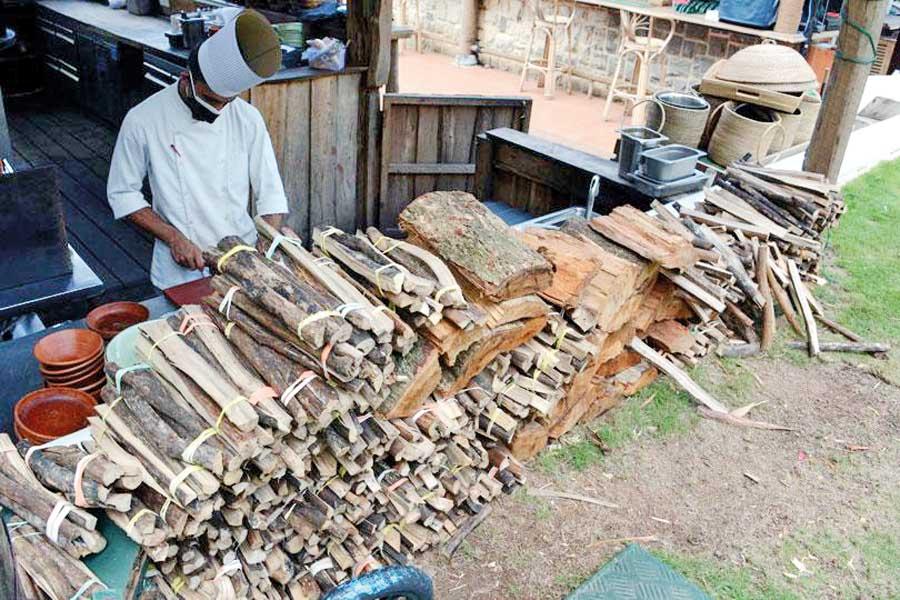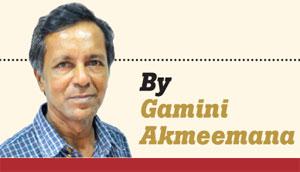31 Jan 2022 - {{hitsCtrl.values.hits}}

Last week, I took the plunge and set up a ‘firewood kitchen apparatus’ in the garage. I went without gas for two days before a neighbour got me a cylinder for the princely sum of Rs.3,000. It’s like getting a suicide bomber into the house, but you don’t think twice about it. A few days ago, a friend said he paid Rs.3,300 for his. People are begging for gas.
days before a neighbour got me a cylinder for the princely sum of Rs.3,000. It’s like getting a suicide bomber into the house, but you don’t think twice about it. A few days ago, a friend said he paid Rs.3,300 for his. People are begging for gas.
I began cooking with firewood mainly to feed the dogs. I have to cook a large pot to feed those at home as well as around town. The gas is used sparingly for our meals and boiling water. Cooking with electricity is not an option because the bills are already high. Kerosene is not cheap either, and I have to travel 5 km to find it. Kerosene cookers are messy, need regular cleaning and prices have shot up. So, I would rather use firewood.
Actually, it’s done with coconut husks and shells (given by a neighbour) rather than wood, which is hard to obtain. Firewood bundles are said to be available at some supermarkets at Rs.60 a bundle. Fire consumes dried coconut produce at a frightening pace. When I run out of my present, meager stock, I’ll have to check out the supermarket option.
I remember the firewood cart from my childhood days at Piliyandala. I feel rather nostalgic about it. Why can’t we have firewood carts (or those workhorse battas) bringing us firewood? But my enthusiasm for the kitchen technology of the stone age (It’s believed that the use of firewood became widespread from the Middle Paleolithic to Neolithic, from 55,000 - 3000 years ago) fades the moment I have to start blowing into it to fan the flames. It’s hard work, and takes a big chunk of my valuable time. But my value too, has diminished with the pandemic, or would I be using fire to cook?
"All over the country, it’s back to basics. The government has suddenly woken up to the viability of the humble, much derided bicycle as practical transport befitting the pandemic age. The environment minister wants to take steps to promote the use of bicycles as ‘one way to reduce air pollution"
I remember my grandmother doing this, and only now do I understand what village women went through to put food on the table.
All over the country, it’s back to basics. The government has suddenly woken up to the viability of the humble, much derided bicycle as practical transport befitting the pandemic age. The environment minister wants to take steps to promote the use of bicycles as ‘one way to reduce air pollution.’
Don’t make me laugh. It seems to me this is a rather belated discovery. Various half-hearted attempts to promote cycling have been attempted over the years. But people don’t want to get killed riding bicycles in this maddening traffic. Many city streets are without any shade, and the infrastructure to promote cycle commuting simply isn’t there. On top of all that, bicycles are expensive. The poor man’s workhorse standard bicycle costs Rs. 25,000, and for that price you can get a cheap mountain bike which will fall apart with the first heavy rains. In cycle shops, you can meet customers asking for easy payment terms (not available for bicycles).
It has taken a pandemic to demonstrate in no uncertain terms that we are lagging behind much of the rest of the world in vital areas – we are surrounded by the Indian Ocean, but many can’t afford sardines because it has to be imported. We produce good quality rubber, but vehicle owners are frantically hunting for tyres as they have to be imported. The list is long, but you get the point.
"A casual look at city streets, though, and one can have entirely the wrong impression. I have seen people walking city streets without masks. The hand-washing routine is now a thing of the past"
Barely weeks after the disastrous, nerve-wracking third Coronavirus wave beginning in October 2021 brought the country to its knees, complacency has set in once again. This is hardly surprising. We are a complacent nation, from politicians to the man selling trinkets or lottery tickets in the street. The difference is that, while politicians always have reasons to be complacent, most Sri Lankans are now in tatters, with no reason to be complacent at all.
A casual look at city streets, though, and one can have entirely the wrong impression. I have seen people walking city streets without masks. The hand-washing routine is now a thing of the past. The bigger businesses offer a dose of sanitizer at their entrances, but even this precaution isn’t always taken. Temperature checks too, have become casual.
And why not? Though Omicron cases are rising, death rates are dramatically down from the nightmarish days which led to the last lock-down. That omicron is generally milder than the Delta variant leads to more complacency and carelessness, and it’s back to business as usual. Schools have re-opened, staff are required to return to offices instead of working from home, the streets are jam packed with traffic, at least during rush hours.
But we are in the eye of an economic storm – and it’s not perfect. Never mind the statistics. Many essential food items have become unaffordable, and some are unavailable. Gas, electricity, maintenance of public and personal transport – all these have reached unprecedented crisis levels.
The government, or what passes for government right now, has found a convenient scapegoat – the pandemic is to blame. Not entirely. Countries poorer than ours have done a much better job at surviving the pandemic. What the pandemic has done to us is to expose the folly of depending so much on imports as a country.
28 Nov 2024 58 minute ago
28 Nov 2024 2 hours ago
28 Nov 2024 3 hours ago
28 Nov 2024 3 hours ago
28 Nov 2024 5 hours ago